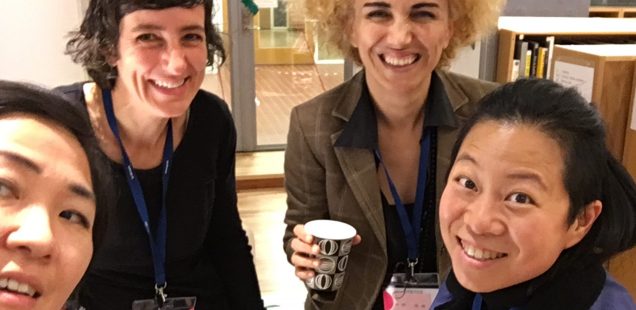
PARSE conference 2017 EXCLUSION
The 2017 biennal PARSE conference on EXCLUSION tackled very current questions of inequality, neocoloniality and legitimacy as they are expressed and produced through culture and cultures of artistic education.
November 15–17, 2017. Venue: Faculty of Fine, Applied and Performing Arts, Gothenburg, Sweden.
copyright of photo: Minjeong Ko, Globala Tanter at PARSE Gothenburg, 2017
The conference was structured in 6 strands:
Indigeneity is for many a politically enabling construct in resisting ongoing colonialisms, expropriations, and associated epistemic violence. It is also marked by multiple exclusions: conceptually, as irredeemably rooted in essentialism, primordialism and primitivism; strategically, as counter-productively factionalising and exoticising; juridically and pragmatically, as untenable within the various regimes of globalisation.
Educational exclusion addresses mono-cultural aspects of arts education as well as proposes how education in the arts can be fundamentally reshaped to become more accountable to manifold embodied knowledge practices.
Colonisation and Decolonisation addresses colonial and master paradigms in the arts as well as institutional, communal and collective perspectives and looks to strategies for a new arts and humanities that embraces epistemic and disciplinary disobedience, non-capitalist, pluri-national institutions and modes of aesthetic production.
Geographies of Exclusion addresses how social, cultural, political and economic barriers produce and sustain public spaces, public spheres, public memory, borders and migrants and their experiences of movement through the logic of circulation managed, controlled, and regulated by state authorities, public institutions, NGOs and private firms. It also addresses how such dominating modes of productions can be transgressed through civil counter-actions and independent self-organised practices.
Vocabularies of Exclusion focuses on forms of exclusion produced through language as well as embodied and discursive practices. Reflecting on the terms and conditions of artistic and political work in cross-disciplinary contexts, it explores and interrogates languages of inclusion, separation, and participation as they are produced and enacted in the present moment in the field of cultural production and its context in wider socio-political arenas.
Participation as Exclusion deals with the fact that “participatory turn” in cultural production, urban development, and so forth is now a dominant theme in Western art and design discourses and practices as well municipal governance, where it has moved from a marginalised area of community practice into the mainstream. This consideration inquires who the subjects of participation are and how and from where they were selected. It addresses questions such as Why are certain people seen to be in greater need of receiving participatory “support”? How, if at all, is power and decision-making redistributed?
Art.School.Differences was present in the Educational Exclusion strand with a presentation about: Exclusion from inside out: The intersectional working of class in artistic education. Refer to the web for the abstract. See the powerpoint presentation Exclusion inside out for download.
To watch the conference keynotes online, please refer to PARSE conference Afterwards. Meanwhile the Parse Journal “Exclusion”, Issue 8 Autumn 2018 with conference contributions has been published.
For an action plan to curb ongoing exlusion of minority groups, refer to the list proposed by Craig Wilkins during his talk that he made available for our blog.
Refer also to the Manifesto launched at PARSE Exclusion Conference November 2017. The Manifesto is the result of a two-day Learning Lab inspired by the self-organising work of the Restad Gård Support Group Network at Akademin Valand, Göteborgs Universitetet (see also Kultur i Väst). The Manifesto author’s shared aim is to highlight the current realities of social and cultural segregation effecting asylum-seekers and refugee communities living in Gothenburg and to make improvements to this situation. The Manifesto has been collectively drafted by members of the Restad Gård Self-Support Group Network, representatives from Valand Academy, Outgrain, Counterpoints Arts and individuals from a range of arts and educational organisations in Gothenburg in the surrounding Västra Göteland region.
We are inviting organisations regionally, nationally and internationally to sign up to the Manifesto. Please contact Adndan Abdul Ghani or Denise Langridge Mellion by e-mail: Adnan.Abdul.Ghani@rb.se or denise.mellion@akademinvaland.gu.se.
